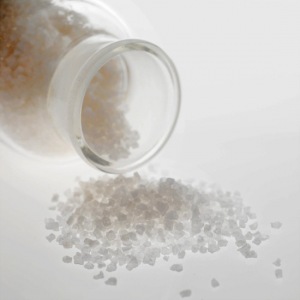Tag Archives: synthetic drug
Bath salt zombies scare cadets straight in Navy-produced video
The Navy has a new weapon in its arsenal against designer drug abuse: the mini-movie Bath Salts: It’s Not a Fad, It’s a Nightmare.
Available to the public on YouTube (and at the bottom of this page), the 6:37 minute movie uses horror-movie style special effects to simulate the hallucinogenic and often violent effects of the drug.
Shot from a young sailor’s point of view, the first 2 minutes of the video put the viewer behind the eyes of a cadet as he smacks his girlfriend in a bowling alley, witnesses his roommate morph into a horrific demon, and ultimately ends up convulsing on a hospital bed as he is held down by camouflage-wearing doctors.
According to Lieutenant George Loeffler, Chief Psychiatry Resident at the Naval Medical Center in San Diego, treatment centers within the armed forces are seeing more cases of bath salt abuse every month. In early 2012, the Navy announced an “alarming increase” in designer drug use, which led to 1515 sailors being discharged in 2011 alone according to the Navy-run Jet Observer.
Mr. Loeffler explained that paranoid delusions and psychotic episodes that last long after the drug is out of their systems. “When people are using bath salts, they’re not their normal selves. They’re angrier, they’re erratic, they’re violent, they’re unpredictable.”
“People will start acting really weird, seeing things that aren’t there, believing things that aren’t true,” Loeffler continued. “Some people describe people spying on them, trying to kill them and their families, other people talk about seeing demons, and things that are trying to kill them.”
The designer drug has the potential to cause permanent damage. “One of the most concerning things about bath salts is that these hallucinations, these paranoid delusions, will last long after the intoxication’s gone,” Loeffler says.
Similar to the designer drug spice—the synthetic version of marijuana until recently sold over the counter in tobacco shops—bath salts contain unknown ingredients which vary widely depending on the source. This makes experimenting with the drug essentially a game of Russian roulette, often with devastating effects.
Reports of a 31-year-old man named Rudy Eugene attacking a 65-year old homeless man in Miami, stripping off the victim’s clothes, and proceeding to eat his face recently brought national attention to the potential dangers involved with bath salts.
It later turned out that Mr. Eugene was not in fact using the synthetic drug, though the psychotic episodes and paranoid delusions experienced by the assailant are consistent with known side effects.
The military treats soldiers who test positive for drug use with a strict “zero tolerance”, and are increasingly able to detect many designer drugs. Many of the most dangerous chemicals, however, do not register on drug tests, according to Mr. Loeffler. This fact has been used specifically to market the drug to sailors, soldiers, and marines.
Are the Navy’s methods to discourage bath salt use excessively dramatic in their recent video, or appropriate to counter an increasingly threatening epidemic of designer drug abuse?
Decide for yourself after watching the video:
Hungry? Try the new zombie diet
One of my favorite episodes of the classic television series “The Twilight Zone” was  titled “To Serve Man.” Aliens visited Earth and proceeded to help humanity solve its social, political and medical problems while setting up an exchange program. A tool was a book with the title of “To Serve Man,” which turned out to be a cookbook with recipes on how to prepare people as meals.
titled “To Serve Man.” Aliens visited Earth and proceeded to help humanity solve its social, political and medical problems while setting up an exchange program. A tool was a book with the title of “To Serve Man,” which turned out to be a cookbook with recipes on how to prepare people as meals.
That imaginative episode of the sci-fi series seems to be playing out in a slightly different form the past two months. Zombie-mania is taking hold of the country, with reports of people eating each other and other creatures.
The entertainment industry is filled with movies and television shows depicting zombies in all of their mindless, flesh-eating gory glory. A cottage industry has tips, products and processes to protect humanity from the living dead.
But zombies aren’t just for entertainment anymore. They have infiltrated real life.
Following the news recently has been a trip through weirdville, with reports on cannibalism and assorted stomach-turning events. Movies, television shows and social media conversations have elevated the topic to near maniacal status, focusing especially on the zombie potential.
One of the first reports came from Miami on May 26, as police shot a naked man eating another man’s face. A few days later, a college student in Maryland told police he killed a man and then ate his heart and part of his brain.
Then things got really weird. In New Jersey, a man stabbed himself 50 times and threw bits of his own intestines at police, who then pepper-sprayed him but still had a hard time bringing him down.
Also in May, police discovered a video that appeared to show Canadian porn performer Luka Magnotta, 29, slashing his bound young lover with an ice pick. He then reportedly abused and dismembered the corpse before eating some of the man’s remains with a knife and fork. Detectives in Montreal allege Magnotta then mailed some body parts to members of the Canadian Parliament. Magnotta was arrested about two weeks later in Germany.
The lunacy continued with other reports in June, including one of a man who ate his dog.
While some are equating the rise of this type of incident to zombies and end-of-the-world prophecies, cooler heads are blaming a more mundane and man-made cause: drug abuse. The New Jersey event is being specifically blamed on a drug mixture known as “bath salts.”
Florida officials describe bath salts as a synthetic drug that reportedly produces “an extreme high of euphoria” and is comparable to amphetamines and cocaine. The mixture is sold as potpourri and incense at liquor stores, gas stations and head shops. Officials said in order to know exactly what is in each package you have to seize them from the store and test them in a lab.
Some state legislatures, Michigan included, have taken steps to outlaw the product. The federal Centers for Disease Control and Prevention in Atlanta released a statement saying there is no Zombie Apocalypse on the horizon.
Personally, I think the CDC’s statement is just a diversion to hide the truth.
In the meantime, bolt the doors, stockpile the food and keep your loaded weapons nearby. Remember, zombies are already dead. The only way they can be stopped is by destroying the brain, according to people who have studied this sort of thing.
ZOMBIE OUTBREAK – Are synthetic drugs creating zombies?
Zombies are no longer fictional characters that inhabit our movie screens. They have  become “real” in the eyes of some people thanks to the new synthetic drugs that are young people have discovered.
become “real” in the eyes of some people thanks to the new synthetic drugs that are young people have discovered.
HEADLINE from last week: “Man Eats Family Dog After Police Say He Ingested K-2.” This is not a “National Enquirer” headline. This came directly from the Waco, Texas, ABC TV affiliate.
Witnesses claim Michael Daniel assaulted people at his home, chased a neighbor, and began barking and growling. He then picked up the family dog, strangled it, and then began to eat it, hair, flesh and all. Family members claim Daniel was experiencing a bad trip after ingesting K-2.
This is only two weeks later after the infamous Miami incident, where a man, high on synthetic drugs, chewed off the face of a homeless man along a stretch of busy highway. Since then similar zombie/cannibal incidents have been reported in Manatee County, Florida, Maryland, Louisiana, and now Texas. The Maryland incident involved a man reported a man killing and then eating his roommate’s heart and brain. They all have been attributed to synthetic drugs.
Spice, K-2, potpourri, space, bath salts, etc. are forms of synthetic marijuana that until recently were legal and found in many stores. Essentially they are a mixture of dried herbs and spices mixed with chemicals. These drugs are undetectable by smell or drug testing and are quickly becoming the drug of choice amongst drug users.
Here in Clare County, the health department demanded that retailers take the synthetic drugs off their shelves. This is not the case, however, in other counties. One only has to make the short drive to Bay City where I’m told synthetics are sold at Earth Oddities, Kings and CB Discount.
I’m sure in short order, the sale of synthetics will be banned statewide. However, will that solve the problem? I don’t think so. Because they are readily available, cheap, and provide a quick high, drug users will continue to purchase the drugs illegally.
And that’s a problem. Along with the cannibalistic atrocities, several murders and violent crimes have been attributed to synthetic marijuana. If meth makes people hallucenogenic, synthetics drive some people to violent acts and craziness. It is, say many, the worst drug to come along in a long while.
It’s great that Clare County has prohibited the sale of synthetics. They acted quicker than a lot of counties in this regard. However, as many of us know, a lot of Clare County’s drug problem comes from downstate. Drug users continually run down to buy their drugs off of Detroit area streets to bring them back here to sell and use.
If one is to believe the zombie apocalypse is near- after all it is trending all over the internet, and we all know to believe everything we read on the internet, then we need to do everything we can to eliminate these drugs that make some people want to act like zombies.
More importantly, synthetic drugs, whether they are bath salts, K-2 or whatever, have no business being in the hands of irresponsible drug users. Let’s hope they get a clue, and get off the crap, asap.
MIAMI ZOMBIE – No Bath Salts, Only Marijuana Found In Face-Eater Toxicology Tests
According to a full toxicology report released Wednesday afternoon by the Miami-Dade medical examiner, the only drug detected in the lifeless body of infamous Miami face-chewer Rudy Eugene was marijuana.
“The department’s toxicology laboratory has identified the active components of marijuana,” the medical examiner said in a statement, according to NBC Miami. “The laboratory has tested for but not detected any other street drugs, alcohol or prescription drugs…This includes cocaine, LSD, amphetamines (Extasy, Meth and others), phencyclidine (PCP or Angel Dust), heroin, oxycodone, Xanax, synthetic marijuana (Spice), and many other similar compounds.”
CBS Miami reports that the medical examiner’s office sought the assistance of an “outside forensic toxicology reference laboratory” to help confirm the absence of common ingredients of bath salts, a synthetic amphetamine cocktail blamed inseveral recent incidents that bear some similarity to Eugene’s attack.
“Within the limits of current technology by both laboratories,” stated a press release from Medical Examiner Dr. Bruce Hyma, “marijuana is the only drug identified in the body of Mr. Rudy Eugene.”
The report did not address previously reported autopsy findings of what appeared to be undigested pills in Eugene’s stomach, according to the Miami Herald, and an expert told the Associate Press marijuana alone was not likely to cause such an attack.
“The problem today is that there is an almost an infinite number of chemical substances out there that can trigger unusual behavior,” said Dr. Bruce Goldberger, Professor and Director of Toxicology at the University of Florida.Goldberger said that the medical examiner’s office in Miami is known for doing thorough work and that he’s confident they and the independent lab covered as much ground as possible. But it’s nearly impossible for toxicology testing to keep pace with new formulations of synthetic drugs.
“There are many of these synthetic drugs that we currently don’t have the methodology to test on, and that is not the fault of the toxicology lab. The challenge today for the toxicology lab is to stay on top of these new chemicals and develop methodologies for them, but it’s very difficult and very expensive.” Goldberger said. “There is no one test or combination of tests that can detect every possible substance out there.”
The medical examiner’s office did not immediately respond to requests for comment.
Eugene, 31, was widely speculated to have been on some form of synthetic drugs or suffering a drug-induced psychosis the afternoon of May 26 when he stripped naked and brutally attacked homeless resident Ronald Poppo in broad daylight along Miami’s busy MacArthur Causeway, chewing and ripping off roughly half of the older man’s face.
A police officer responding to multiple 911 calls shot and killed Eugene as he crouched over Poppo, reportedly refusing to stop the gruesome assault by growling at the officer with Poppo’s flesh in his mouth.
The 18-minute attack and its aftermath were captured on surveillance video from the Miami Herald’s parking garage, but it is still unknown what prompted Eugene to commit such a horrific crime.
According to Local10, the former North Miami Beach High School football player was once diagnosed as schizophrenic after an arrest, but authorities are not sure if he ever sought treatment.
Records show Eugene had been arrested 8 times since the age of 16, including 4 instances involving marijuana. But though he was once accused of threatening to kill his mother, friends and family members alike say they never expected such violence from Eugene, who was participating in a Bible study, reading the Koran, and telling friends he wanted to stop smoking marijuana.
“There’s no answer for it, not really,” Eugene’s younger brother, Marckenson Charles, told the AP. “Anybody who knew him knows this wasn’t the person we knew him to be. Whatever triggered him, there is no answer for this.”
Poppo, meanwhile, is doing “well,” according to doctors at Jackson Memorial Hospital’s Ryder Trauma Center. The 65-year-old has lost one eye, is missing his nose, and faces a string of surgeries to repair his wounds and reconstruct his face.
“We have mental health professionals to help him with the coping, and he’s coping remarkably well,” said plastic surgeon Dr. Wrood Kassira.
This is a developing story.
